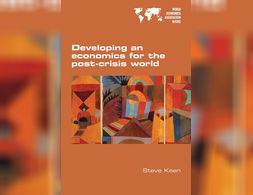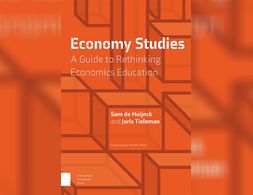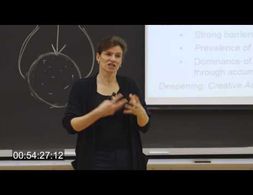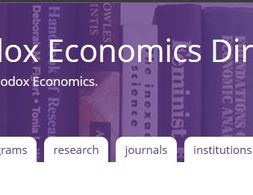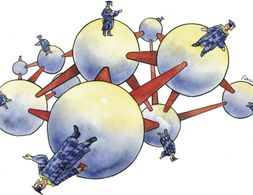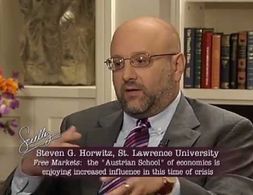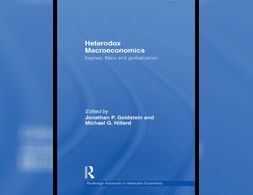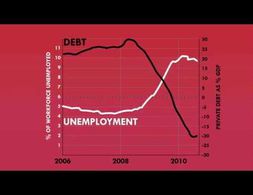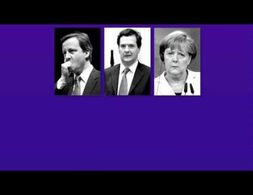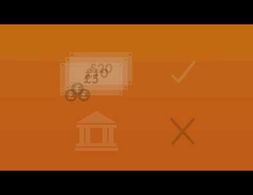✕
990 results
This book is a collection of Steve Keen's influential papers published over the last fifteen years. The topics covered include methodology, microeconomics, and the monetary approach to macroeconomics that Keen - along with many other non-mainstream economists - has been developing.
Microeconomics: A Critical Companion offers students a clear and concise exposition of mainstream microeconomics from a heterodox perspective.
In this volume, Katz offers a detailed summary of the foundations, evolutions and approaches of Dependency Theory in Latin America, focusing on the regional interpretations of Marxism, Developmentalism and World-Systems Theory.
This teaching pack focuses on the practice and real-world activities of central banks. It assumes students have a grasp of basic macroeconomic concepts already, and is therefore most suitable to be used at the end of introductory macro courses, or in more advanced macro or monetary economics courses.
Experimental economists are leaving the reservation. They are recruiting subjects in the field rather than in the classroom, using field goods rather than induced valuations, and using field context rather than abstract terminology in instructions.
Based on a clear conceptual framework and ten flexible building blocks this handbook offers refreshing ideas and practical suggestions to stimulate student engagement and critical thinking across a wide range of courses Drawing on decades of ideas on how to improve economics education and a growing number of available alternative …
What is innovation, what drives innovation and the process that differentiates firms? What is competition and what kind of dynamics lie behind the differences between firms and their innovative activities? Mariana Mazzucato elaborates on those questions from an evolutionary economics' and Schumpeterian perspective. The slides of her lecture are not visible, hence some visualizations can't be followed.
The Heterodox Economics Directory provides a broad variety of links to heterodox journals, books, conferences, study programs, teaching materials and blogs. Some categories are subdivided by schools of thoughts - it's a valuable source for heterodox material on the internet.
On this episode of the Hayek Program Podcast, Professor Roger Koppl talks with Hayek Program Research Fellow Solomon Stein about his research on experts, evolution, and the dynamics of epistemics, his career, and in what future direction(s) he thinks Austrian economics will go.
Steve Horwitz, professor of economics at St. Lawrence University, gives a concise account of Austrian approach and talks about how it relates to the various current public policy issues.
The current Great Recession, the worst crisis that capitalism has faced since the Great Depression, has failed, at least so far, to generate a change in the teaching and practice of Macroeconomics. This seems bizarre as if nothing has happened and the economists are just going about doing business as usual. In light of this, the current paper attempts to address how Macroeconomics ought to be taught to students at the advanced intermediate level, which gives them an overall perspective on the subject.
This blogpost discusses the bias the Economics discipline has towards Africa. It points out how important conferences on issues regarding Africa take place in Western countries at the expense of those based in Africa.
South Africa’s taxi industry was established by black people in the 1930s and has faced numerous challenges, including those posed by decades of apartheid laws. Covid-19 has highlighted contemporary challenges facing the industry and has also raised questions about how it can keep ‘driving forward’. This podcast explores questions such as what changes need to be made, and who can be the ‘drivers’ of such change.
Jason Collins explains how his evolutionary approach to decision making relates to other approaches of behaviour This piece therefore not only serves as a good introduction to this evolutionary approach but also serves as a great introduction to these other approaches of behaviour namely neoclassical perfect rationality which involves mainly …
Aim of this intensive workshop is 1.) to introduce the participants to the macroeconomic workings of the climate crisis as the background of sustainable finance; 2.) to introduce financial assets with ESG (Environmental, Social and Governance) criteria attached to them and their markets and important institutional players; 3.) to provide a critical perspective on the current setup of sustainable finance; 4.) and to work on in-depth case studies illustrating the workings on ESG-finance markets, its emitters and traders as well as their macroeconomic implications.
In a span of around 12 weeks, the course covers a wide range of topics including agent-based modeling, networks, dynamic, chaos, information, fractals, cooperation models and scaling in biology and society. The course acts as a perfect beginner level introduction spanning a wide range of topics in the field of complexity.
Are humans at their core seekers of their own pleasure or cooperative members of society? Paradoxically, they are both. Pleasure-seeking can take place only within the context of what works within a defined community, and central to any community are the evolved codes and principles guiding appropriate behavior, or morality.
By focusing on the human side as well as the intellectual dimensions of how economists work and think, this collection of interviews with top economists of the 20th century becomes a startling and lively introduction to the modern world of macroeconomics.
Jo Michell discusses some key implications of climate change regarding the standard policy prescriptions of Post-Keynesian economics, particularly relating to the possible necessity of consumption constraints and the presence of recurrent inflation.
Beyond Growth is a collection of educational materials offering a reflection on growth. It was created as a joint project of the associations Fairbindung e. V. and Konzeptwerk Neue Ökonomie, both based in Germany. The page provides learning materials and methods to stimulate thinking about the conditions of our current economy as well as possible alternatives.
A short course introducing co-operative firms, in the context of the Candian economy where various forms of co-operative make up a significant sector of the economy. The course offers foundational knowledge about co-operatives, explaining what they are and how they operate.
Heterodox Macroeconomics offers a detailed understanding of the foundations of the recent global financial crisis
Heterodox Macroeconomics offers a detailed understanding of the foundations of the recent global financial crisis.
The dominant view of inflation holds that it is macroeconomic in origin and must always be tackled with macroeconomic tightening. In contrast, we argue that the US COVID-19 inflation is predominantly a sellers’ inflation that derives from microeconomic origins, namely the ability of firms with market power to hike prices.
Improving Decisions About Health Wealth and Happiness Now available Nudge The Final Edition The original edition of the multimillion copy New York Times bestseller by the winner of the Nobel Prize in Economics Richard H Thaler and Cass R Sunstein a revelatory look at how we make decisions for fans …
Whiteness is a process of learning: one is not born white, but becomes one. In this rich and compelling volume, Sriprakash, Rudolph and Gerrard offer a meticulous (and eye-opening) reading of educational experiences and structures that endorse systemic racism.
The book’s central theme is to develop a new theory of speculative capital related to other forms of capital, the world market, and the state. Unlike most marxist and heterodox theories, the book distinguishes credit and fictitious capital from speculative capital to show its hegemony today in the capital markets.
A previously unpublished collection of Rodney's essays on Marxism, spanning his engagement with of Black Power, Ujamaa Villages, and the everyday people who put an end to a colonial era
Banking 101 is a series of 6 short videos that ask the following questions: How do banks work and how is money created? Is reveals common misunderstandings of money creation and the role of banks. Furthermore, the videos show how models taught in many introductory classes to economics (Econ 101) do not reflect those processes:
Part 1) “Misconceptions around Banking” questions common comprehensions of how banks work (savings = investments).
Part 2) “What's wrong with the money multiplier” states that the model of the money multiplies is inaccurate.
Part 3) “How is money really made by banks” explains the process of money creation, loans and inter-bank settlement.
Part 4) “How much money banks create?” asks what limits the money creation by banks and presents the difference between reserve ratio, liquidity ration, equity and refers to the inter-bank market.
Part 5) Explores the question if banks create money or just credit and especially refers to credit risks.
Part 6) Explains how money gets destroyed when loans are paid back.
Note: The videos refer to the UK monetary and banking system, some explanations don't apply to other banking systems, e.g. the reserve ratio.
Banking 101 is a series of 6 short videos that ask the following questions: How do banks work and how is money created? Is reveals common misunderstandings of money creation and the role of banks. Furthermore, the videos show how models taught in many introductory classes to economics (Econ 101) do not reflect those processes:
Part 1) “Misconceptions around Banking” questions common comprehensions of how banks work (savings = investments).
Part 2) “What's wrong with the money multiplier” states that the model of the money multiplies is inaccurate.
Part 3) “How is money really made by banks” explains the process of money creation, loans and inter-bank settlement.
Part 4) “How much money banks create?” asks what limits the money creation by banks and presents the difference between reserve ratio, liquidity ration, equity and refers to the inter-bank market.
Part 5) Explores the question if banks create money or just credit and especially refers to credit risks.
Part 6) Explains how money gets destroyed when loans are paid back.
Note: The videos refer to the UK monetary and banking system, some explanations don't apply to other banking systems, e.g. the reserve ratio.
Banking 101 is a series of 6 short videos that ask the following questions: How do banks work and how is money created? Is reveals common misunderstandings of money creation and the role of banks. Furthermore, the videos show how models taught in many introductory classes to economics (Econ 101) do not reflect those processes:
Part 1) “Misconceptions around Banking” questions common comprehensions of how banks work (savings = investments).
Part 2) “What's wrong with the money multiplier” states that the model of the money multiplies is inaccurate.
Part 3) “How is money really made by banks” explains the process of money creation, loans and inter-bank settlement.
Part 4) “How much money banks create?” asks what limits the money creation by banks and presents the difference between reserve ratio, liquidity ration, equity and refers to the inter-bank market.
Part 5) Explores the question if banks create money or just credit and especially refers to credit risks.
Part 6) Explains how money gets destroyed when loans are paid back.
Note: The videos refer to the UK monetary and banking system, some explanations don't apply to other banking systems, e.g. the reserve ratio.
We use cookies on our website. Click on Accept to help us to make Exploring Economics constantly better!

